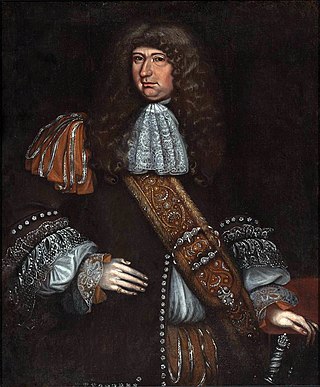Related Research Articles

The Commonwealth was the political structure during the period from 1649 to 1660 when England and Wales, later along with Ireland and Scotland, were governed as a republic after the end of the Second English Civil War and the trial and execution of Charles I. The republic's existence was declared through "An Act declaring England to be a Commonwealth", adopted by the Rump Parliament on 19 May 1649. Power in the early Commonwealth was vested primarily in the Parliament and a Council of State. During the period, fighting continued, particularly in Ireland and Scotland, between the parliamentary forces and those opposed to them, in the Cromwellian conquest of Ireland and the Anglo-Scottish war of 1650–1652.

Oliver Cromwell was an English statesman, politician, and soldier, widely regarded as one of the most important figures in the history of the British Isles. He came to prominence during the 1639 to 1653 Wars of the Three Kingdoms, initially as a senior commander in the Parliamentarian army and latterly as a politician. A leading advocate of the execution of Charles I in January 1649, which led to the establishment of The Protectorate, he ruled as Lord Protector from December 1653 until his death in September 1658. Cromwell remains a controversial figure due to his use of the army to acquire political power, and the brutality of his 1649 campaign in Ireland.

The 1650s decade ran from January 1, 1650, to December 31, 1659.

1654 (MDCLIV) was a common year starting on Thursday of the Gregorian calendar and a common year starting on Sunday of the Julian calendar, the 1654th year of the Common Era (CE) and Anno Domini (AD) designations, the 654th year of the 2nd millennium, the 54th year of the 17th century, and the 5th year of the 1650s decade. As of the start of 1654, the Gregorian calendar was 10 days ahead of the Julian calendar, which remained in localized use until 1923.

The Protectorate, officially the Commonwealth of England, Scotland and Ireland, was the English form of government lasting from 16 December 1653 to 25 May 1659, under which the kingdoms of England, Scotland, and Ireland, with their associated territories were joined together in the Commonwealth of England, governed by a Lord Protector. It began when Barebone's Parliament was dissolved, and the Instrument of Government appointed Oliver Cromwell as Lord Protector of the Commonwealth. Cromwell died in September 1658 and was succeeded by his son Richard Cromwell.

George Monck, 1st Duke of Albemarle KG PC JP was an English soldier, who fought on both sides during the Wars of the Three Kingdoms. A prominent military figure under the Commonwealth, his support was crucial to the Restoration of Charles II in 1660, who rewarded him with the title Duke of Albemarle and other senior positions.

The Anglo-Spanish War was a conflict between the English Protectorate under Oliver Cromwell, and Spain, between 1654 and 1660. It was caused by commercial rivalry. Each side attacked the other's commercial and colonial interests in various ways such as privateering and naval expeditions. In 1655, an English amphibious expedition invaded Spanish territory in the Caribbean. In 1657, England formed an alliance with France, merging the Anglo–Spanish war with the larger Franco-Spanish War resulting in major land actions that took place in the Spanish Netherlands.

Edward Montagu, 1st Earl of Sandwich, 27 July 1625 to 28 May 1672, was an English military officer, politician and diplomat from Barnwell, Northamptonshire. During the First English Civil War, he served with the Parliamentarian army, and was an Member of Parliament at various times between 1645 and 1660. Under The Protectorate, he was also a member of the English Council of State and General at sea.

Sir William Lockhart of Lee (1621–1675), was a Scottish soldier and diplomat who fought for the Covenanters during the 1638 to 1651 Wars of the Three Kingdoms. Following Royalist defeat in the 1642 to 1647 First English Civil War, Lockhart took part in negotiations between Charles I and Scottish Engagers, who agreed to restore him to the English throne.

Sir George Downing, 1st Baronet was an Anglo-Irish diplomat and financial reformer, who held office first under the Commonwealth of England, then Charles II. As Teller of the Exchequer, he carried out major reforms in public finance, including securing passage of the Navigation Acts, intended to protect English maritime commerce, especially from the Dutch Republic.
Events from the year 1645 in England. This is the fourth year of the First English Civil War, fought between Roundheads (Parliamentarians) and Cavaliers.
Events from the year 1674 in England.
Events from the year 1653 in England.
Events from the year 1648 in England. The Second English Civil War begins.
Events from the year 1655 in England.
Events from the year 1656 in England.
Events from the year 1657 in England.
Events from the year 1658 in England.
Sir Thomas Foote, 1st Baronet was a wealthy Citizen and grocer of London. He was Lord Mayor of the City of London in 1649. During the Protectorate he was knighted by the Lord Protector Oliver Cromwell in 1657, and after the Restoration (England) he was made a baronet by Charles II.
Sir William Ellis (1609–1680) was an English lawyer, judge and politician who sat in the House of Commons at various times between 1640 and 1679, and supported the Parliamentary cause in the English Civil War.
References
- 1 2 Palmer, Alan; Palmer, Veronica (1992). The Chronology of British History. London: Century Ltd. pp. 185–186. ISBN 0-7126-5616-2.
- ↑ Plant, David (2010-04-18). "1654". British Civil Wars, Commonwealth and Protectorate, 1638-60. Archived from the original on 2012-02-18. Retrieved 2012-07-10.
- 1 2 3 4 Williams, Hywel (2005). Cassell's Chronology of World History . London: Weidenfeld & Nicolson. p. 266. ISBN 0-304-35730-8.